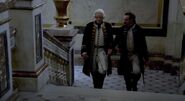| Admiralty | |
| Continent | Europe |
| Location | Whitehall, London |
| Interest | Royal Navy |
| Affiliation | British Empire |
The Admiralty is the government department responsible for the command of the Royal Navy of the British Empire. Their headquarters are located in Whitehall in London. The Admiralty is run by the Sea Lords.
History[]
Background[]
The Office of the Admiral of England was created in 1400. King Henry VIII established the Council of the Marine—later to become the Navy Board—in 1546, to oversee administrative affairs of the naval service. Operational control of the Royal Navy remained the responsibility of the Lord High Admiral, who was one of the nine Great Officers of State.
The Sea Lords are the lords commissioners of the Admiralty. They have direct charge over all naval matters. There are four Sea Lords.
- The First Sea Lord, the Chief of the Naval Staff
- The Second Sea Lord is responsible for personnel and naval shore establishments.
- The Third Sea Lord is responsible for procurement and materiel.
- The Fourth Sea Lord is responsible for transport and stores.
Recent History[]
Lieutenant James McGraw is the liasion sent by the Admiralty to Thomas Hamilton. Hamilton wants to fix the pirate problem of Nassau before it is lost forever. McGraw describes his job as knowing what Hamilton is getting himself into. Thomas is concerned that McGraw is a rising star in the Admiralty, and does not want a partner who is more worried about his career than realizing Thomas' goal.
Thomas and McGraw continue to work together. Hamilton says that McGraw is the partner sent to him by the Admiralty, but McGraw believes this endeavor is doomed to fail. McGraw clarifies that they need to manage their expectations.
Thomas suggests that they offer the pirates pardons, knowing that this is a dangerous idea. McGraw tells him that as his liasion from the Admiralty, he advises that Thomas approach this idea with the utmost caution. As his friend however, James suggests Thomas forget he ever thought of the idea.
Alfred Hamilton arrives at the Hamilton Residence for dinner and to discuss Thomas' progress in formulating a plan. He thinks that the plan sounds fine, although he is concerned with their optimism regarding the ships they believe the Admiralty will outfit for them. He then asks what they plan to do about the pirate raiders of Nassau.
While the campaign against Lord Alfred in Whitehall continues, McGraw offers to bring the idea up to Admiral Hennessey, the closest thing McGraw has to a father.
McGraw approaches Hennessey at Admiralty's offices. McGraw attempts to persuade Hennessey, saying they have an opportunity to prevent a catastrophic loss to the empire by issuing military pardons. McGraw admits he knows how it looks for McGraw to be raising the subject with him here, but he thinks that this is too important to be deterred by imagined dangers.
Hennessey is shocked that McGraw thinks that these dangers are imagined, and reminds him that he tried to warn McGraw about these people. McGraw makes an impassioned plea in support of Thomas Hamilton and the pardons. He reminds Hennessey that on the day McGraw was made an officer, Hennessey told him how proud he was. He also told James that the measure of a man is in the moment in which he is confronted by himself, by opposing voices in his head, both arguing that they are right. Hennessey told James to know the difference in that moment is what makes a man and an officer. McGraw tells his mentor that he sees the difference in this moment, he knows it.
Hennessey then opens the door to his office, revealing Alfred Hamilton inside. Hennessey tells James that Alfred arrived shortly before he did, and told him all about his and Thomas' affair. Henessey says that as much as he would like to believe he could help McGraw recover from his weaknesses and flaws, this is too profane. McGraw begs Hennessey's leave to explain, but Hennessey stops him and tells him to consider himself lucky this did not end on the gallows. McGraw and Miranda are to leave London and never be seen or heard from again. If they do not obey, the charges brought against them will be swift and unyielding.
Season One[]
The Admiralty orders the transfer of the HMS Scarborough from Boston to Harbour Island, to prepare for a move against the pirates of Nassau.
Season Two[]
The Scarborough remains at the Harbour Island garrison, which includes a full comapny of Royal Marines and 200 men in support. Hume is ordered to remain in the Bahamas until he has captured Captain Flint. He has been authorized to offer ten pardons to Billy Bones and nine men of his choosing if he brings Flint to Harbour Island. Vice Admiral Lord Kensington is Flint's prosecutor at his trial in Charles Town.
Season Three[]
Woodes Rogers begins an endeavor to reconcile Nassau with the British Empire. He has a fleet of eight ships, which includes four privately owned ships and a privateer. The other three ships, the HMS Milford, the HMS Rose, and the HMS Shark, are loaned to him by the Admiralty, along with 700 British Regulars. The Milford is Rogers' lead naval escort, and Commodore Peter Chamberlain accompanies him as an advisor, and many other naval officers are included in Rogers' staff. After his capture, Charles Vane is to be boarded on to the HMS Shark and shipped to London, where he will face a Court of the Admiralty.
Season Four[]
With the outbreak of war with Spain, Rogers' fleet is recalled to England. Chamberlain sails them home, but Captain Berringer leads a mutiny of several hundred men who remain in Nassau to help Rogers fight the pirates.




